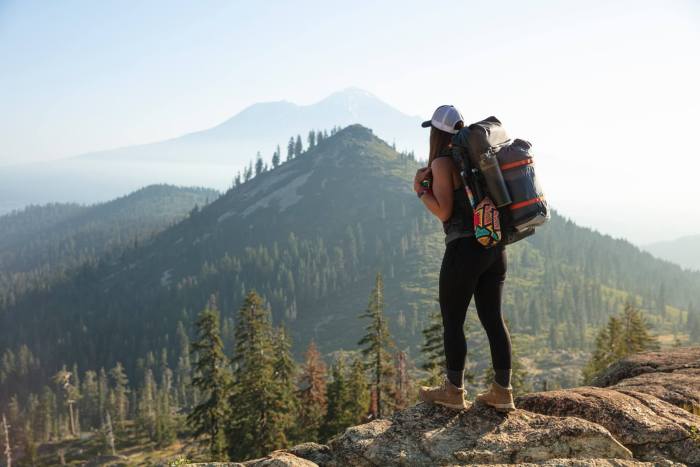Backpacking Northern California offers an unparalleled adventure, from the majestic Sierra Nevada to the towering redwoods and rugged coastline. This guide dives deep into planning your perfect backpacking trip, covering everything from choosing the ideal trail and packing your gear to understanding essential safety precautions and leaving no trace. Whether you’re a seasoned backpacker or a curious beginner, get ready to explore some of the most breathtaking landscapes in the Golden State.
We’ll explore the best trails, ranked by difficulty and scenery, providing detailed itineraries and packing lists to ensure a smooth and unforgettable experience. Learn about the unique ecological features of different regions, discover essential gear, and master the art of responsible backpacking to protect this pristine wilderness for generations to come. This isn’t just a guide; it’s your roadmap to an epic Northern California backpacking adventure.
Respecting the Environment While Backpacking in Northern California: Backpacking Northern California

Northern California’s breathtaking wilderness areas, from the redwood forests to the rugged coastline, are incredibly valuable natural resources. Responsible backpacking is crucial for preserving these environments for future generations. Leaving no trace is more than just a slogan; it’s a commitment to minimizing our impact and ensuring the longevity of these stunning landscapes. This section details the essential practices for environmentally conscious backpacking in Northern California.
Leave No Trace Principles
The Leave No Trace principles are a set of guidelines designed to minimize the impact of outdoor recreation. Adhering to these principles is paramount to preserving the pristine beauty and ecological integrity of Northern California’s wilderness. Failure to do so can lead to trail erosion, habitat destruction, and a diminished experience for other visitors.
- Plan Ahead and Prepare: Proper planning includes researching trail conditions, obtaining necessary permits, and packing appropriate gear to avoid unnecessary waste and resource consumption. For instance, knowing the water sources along your route will prevent you from carrying excessive water weight and potentially littering empty bottles.
- Travel and Camp on Durable Surfaces: Stick to established trails and campsites to prevent soil erosion and damage to vegetation. Avoid creating new trails or campsites. This means staying on designated paths, even when tempted to take shortcuts. The cumulative effect of many people taking shortcuts can significantly damage the environment.
- Dispose of Waste Properly: Pack out everything you pack in. This includes food scraps, toilet paper, and even orange peels. Proper waste disposal prevents pollution of water sources and soil contamination. Utilizing designated waste receptacles or packing out waste in airtight bags is essential.
- Leave What You Find: Resist the urge to collect rocks, plants, or other natural objects. Leave everything as you found it, allowing nature to maintain its balance and beauty. Removing even a small rock can disrupt the natural ecosystem and impact other wildlife.
- Minimize Campfire Impacts: Use existing fire rings or stoves instead of starting new fires. If a fire is necessary, keep it small and contained, and ensure it’s completely extinguished before leaving. Improperly extinguished campfires are a leading cause of wildfires in Northern California, causing significant environmental damage.
- Respect Wildlife: Observe wildlife from a distance and never feed or approach animals. Maintaining a safe distance protects both wildlife and humans, ensuring the animals are not habituated to human contact, which can lead to negative consequences for their survival.
- Be Considerate of Other Visitors: Respect other backpackers and their experience by keeping noise levels down and yielding to others on the trail. This promotes a positive and enjoyable experience for everyone, encouraging continued responsible use of the wilderness.
Best Practices for Minimizing Environmental Impact
Beyond the Leave No Trace principles, specific practices can further minimize your impact. These practices are not optional; they are integral to responsible backpacking and the long-term health of Northern California’s wilderness.Proper waste disposal involves packing out all trash, human waste (using a WAG bag system), and food scraps. Campfire safety requires using existing fire rings, ensuring complete extinguishment, and avoiding campfires altogether if possible (using a portable stove is preferable).
Proper food storage is crucial to preventing encounters with wildlife and reducing the potential for attracting animals to the campsite.
Responsible Backpacking and Conservation, Backpacking Northern California
Responsible backpacking directly contributes to the conservation of Northern California’s natural resources. By following Leave No Trace principles, backpackers help prevent trail erosion, protect fragile ecosystems, and maintain the pristine quality of water sources. This collective effort ensures the continued enjoyment of these areas for future generations. For example, the reduced impact of responsible hikers helps maintain the health of Redwood National and State Parks, allowing these magnificent trees to continue to thrive.
Similarly, responsible backpacking in Yosemite National Park helps preserve the delicate balance of its diverse ecosystems.
Backpacking Northern California is more than just a hike; it’s an immersive journey into nature’s grandeur. By carefully planning your trip, prioritizing safety, and respecting the environment, you can create an unforgettable experience. Remember, responsible backpacking ensures the preservation of these incredible landscapes for future adventurers. So, pack your bags, embrace the challenge, and prepare to be captivated by the stunning beauty and raw power of Northern California’s wilderness.
Your adventure awaits.

